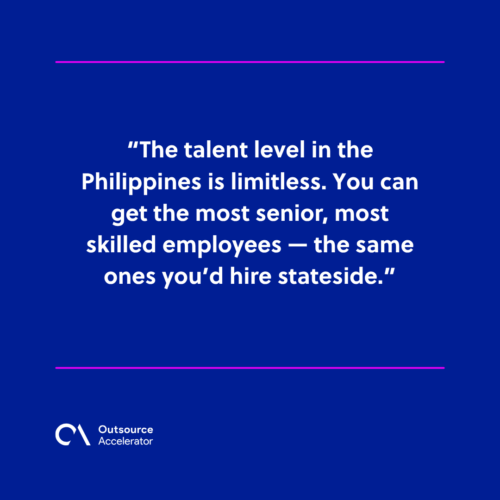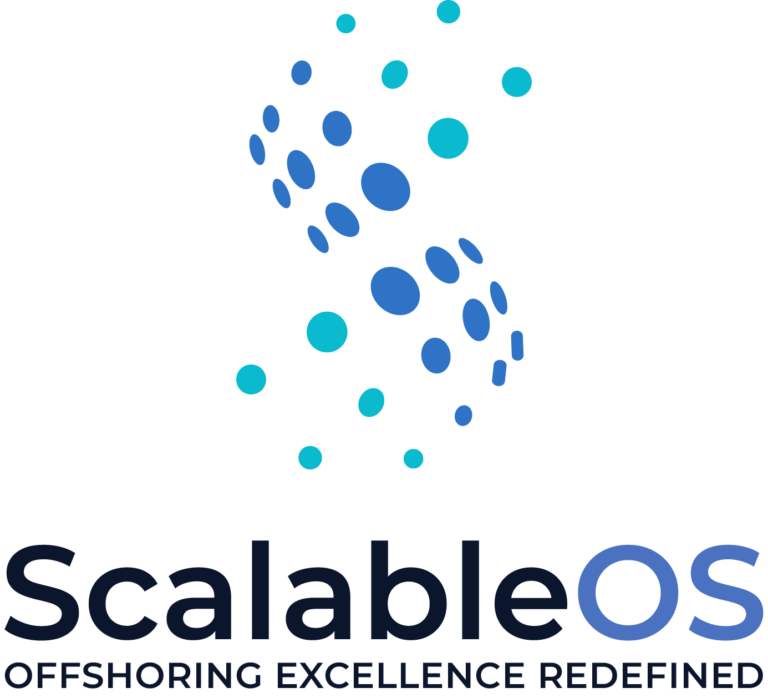Why talent quality matters more than cost savings in offshoring

For many businesses, offshoring still begins with one simple question: How much money can we save?
But the most successful organizations have realized that real value doesn’t come from slashing costs. It comes from investing in offshore talent quality. When you build teams based on skill, fit, and long-term potential, the savings follow naturally.
Outsourcing veteran Chris Van Vladricken, CEO and founder of ScalableOS, explained it in the 560th episode of the Outsource Accelerator Podcast.
“The experience will succeed or fail based on the quality of the team members you provide. You can do everything right, [but] none of it matters if the person sitting at the desk performing the work for the client isn’t doing extremely well”
This article explores his insights on why companies should be more concerned with talent quality than the immediate cost benefits from outsourcing.
Understanding offshore talent quality
So what exactly defines offshore talent quality? It’s more than degrees or experience.
It’s a blend of technical competence, communication skills, cultural fit, and the ability to operate autonomously across time zones.
Chris has spent nearly two decades working with professionals in the Philippines and has seen how the local workforce has evolved into a global talent hub, even outside the hotspot of Manila.
As he put it, “The talent level in the Philippines is limitless. You can get the most senior, most skilled employees — the same ones you’d hire stateside.”
When businesses start seeing offshore hiring not as a bargain hunt but as a strategic expansion of their workforce, they unlock a new level of capability. This mindset goes far beyond simple cost efficiency.

The true cost of compromising on quality
There’s a hidden danger in focusing solely on price when building offshore teams. Low-cost hiring often leads to mismatches, high turnover, and performance gaps that erase any short-term savings.
Chris has encountered this with many companies, who have ended up walking away with a poor view of the outsourcing method.
He acknowledges that “a small percentage don’t [work out well]. But I encourage [clients] not to let that define how they think of the Philippines.”
This perspective underscores a critical truth: success in offshoring isn’t about perfection, but about persistence and process. When you prioritize quality, you minimize rework, improve retention, and create an environment where both client and employee can thrive.
5 proven benefits of prioritizing offshore talent quality
Before diving into best practices, it’s important to understand what makes offshore talent quality such a game-changer. Beyond filling roles, it transforms operations, company culture, and business scalability.
Here are five tangible benefits that come from hiring for quality over cost:
1. Higher productivity and efficiency
High-quality offshore professionals don’t just complete tasks — they optimize them.
Skilled employees bring expertise and initiative, reducing supervision time and improving overall output. They help clients move from “managing work” to “achieving results.”
2. Improved client–employee alignment
When clients invest in the right people, relationships become partnerships. Chris explained, “It goes both ways. The client has to have a great experience. The employee has to have a phenomenal experience.”
This alignment ensures mutual trust, engagement, and consistent performance.
3. Stronger retention and team stability
Skilled offshore talent tends to stay longer because they’re treated as professionals, not disposable resources. HR professionals echo this sentiment, noting that “positive employee experience begets customer experience.”
This stability leads to fewer disruptions and a more consistent client experience. That’s a crucial advantage in industries where continuity matters.
4. Enhanced global competitiveness
Access to high-level offshore professionals allows smaller companies to compete with larger players.
As Chris observed, many clients are surprised by the caliber of talent available.
“[When] they get some success under their belt, the gears really start turning internally. [They say] ‘Hey, we have this senior-level finance position that we have open. [Or] we have these marketing and sales positions…’
I think that’s where you really start getting some good traction.”
5. Long-term cost efficiency
Ironically, prioritizing quality leads to better cost savings in the long run. Skilled professionals need less training, make fewer errors, and produce higher-value outcomes.
As Chris often reminds clients, saving money should be the byproduct of good hiring — not the goal itself.

5 best practices for ensuring high offshore talent quality
Knowing that offshore talent quality drives success, how can companies consistently achieve it? It requires deliberate processes, clear expectations, and an investment mindset.
Here are five proven best practices to ensure offshore teams deliver lasting value:
1. Set the same standards you would locally
One of Chris’s key pieces of advice is to hold offshore candidates to the same expectations as local hires.
“Keep the bar where you would normally keep it. There is zero expectation of you lowering the bar as you say yes to certain candidates that we’re bringing onto your team.
If you do that, you’ll get the best outcome.”
This mindset builds parity, professionalism, and accountability.
2. Focus on cultural and communication fit
Beyond technical skills, look for individuals who align with your company’s culture and communication style. This ensures smoother collaboration and reduces friction between distributed teams.
As Chris noted, every person and client manager is unique — success depends on matching personalities as much as capabilities.
3. Integrate offshore teams into your company culture
Treat offshore professionals as part of the team, not as outsiders.
“From day one, we drive home that these are their employees. They should think of them as their employees,” Chris emphasized.
When employees feel ownership and inclusion, their performance naturally improves.
4. Invest in relationship management
Strong client–employee relationships don’t happen by accident. Scalable companies build infrastructure around communication, HR support, and success coaching.
For ScalableOS, Chris credits his client success and people support teams for making it happen.
“[They] connect with the individual employees and make sure that they understand their job requirements, their expectations, that they clearly understand what is success and what is failure.
Really those two departments are kind of the glue that holds everything together for our clients.”
5. Embrace long-term partnership thinking
The best offshore relationships evolve over time. Businesses that begin with one or two hires often expand into full departments once they see the results.
As Chris shared, “We see that time and time again, where we show our clients that capability through their first experience with us.
And it’s usually something that’s gonna open doors in their mind of what they can do in the Philippines.”
By thinking long-term, companies can unlock the full strategic value of offshore talent quality, not just short-term labor savings.







 Independent
Independent




